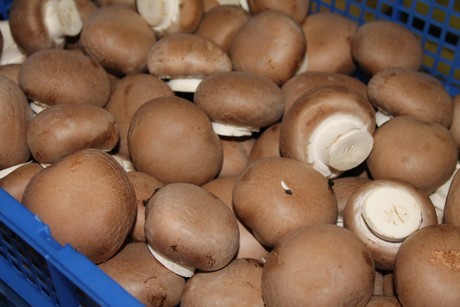Kanters Paddenstoelen from Heeswijk, the Netherlands, supplies a broad range of mushrooms in various varieties, shapes and mixes. Jasper started producing white mushrooms in 1992. Ten years later he decided to do his own trading. “We buy from four growers. Besides the white mushrooms from our own nursery, we also trade in chestnut mushrooms, portobellos, shiitake and oyster mushrooms,” he says. “We also buy mushrooms elsewhere. Because of this, we can supply a complete package year-round.”

The company’s production, and that of the growers they work with, never stands still. The mushrooms are mostly shipped to permanent wholesalers in the Netherlands, Belgium and Germany for delivery to retail and catering. Besides the standard orders, they also regularly receive orders during the day, which can be picked up within a few hours. “This requires flexibility. It can be quite challenging to have everything ready in time, but it also provides us with the opportunity to be distinctive.”
Prices barely cover costs
The unrest among growers about the low prices are classified by Jasper as a tricky matter. “But something has to change, that much is certain. In a 25-year period, the number of Dutch mushroom companies declined from 900 to about 70, and it won’t stop there. That we started doing our own trading and expanded our range might have been our salvation.” Although this doesn’t mean that costs and yields of white mushrooms are currently in proportion, according to him. He mentions that costs for growers have only increased, while prices for a punnet of mushrooms only dropped in the past five years. The competition from Polish mushrooms can be added to that, because these are cheaper than the Dutch mushrooms. “It’s naturally up to the growers themselves to make the agreements, but I don’t expect consumers would stop buying mushrooms if prices were to increase a bit. I personally think our product doesn’t get enough appreciation. The mushroom production supplies a healthy and clean product, and besides, it offers a lot of jobs because of all the manual labour. I truly hope we’ll get the financial appreciation this sector deserves.”
According to Jasper, pride and appreciation should also come from the sector itself. He regrets that so few mushroom companies work together. “I once made the decision to grow mushrooms, because it was a very collective sector. Not much is left of this. By working together, more would probably be possible.” However, the trader mostly wants to look ahead, and he’s feeling positive. For years, Jasper had health problems, but he says he’s been completely back in business for some months now. Now that his son Marco started working for the company, and said he wants to continue the business in future, optimism plays first fiddle. “Only if there’s a successor and plenty of workers do I see a future for the Dutch mushroom. However, it’s a tough job, and that won’t change, but there are definitely opportunities. In the next few years it will become apparent how many growers will be left, and whether there will be plenty of people willing to help with the harvest. We continue to be very much dependent on that.”
He personally definitely still sees potential. “We’re looking for innovations. Not much happened in this field for years, because there was no money, but it could actually boost the product. To get a budget for this, I would like to see prices recover. As soon as there’s financial appreciation, there might be more room for marketing, and we could definitely use that.”






